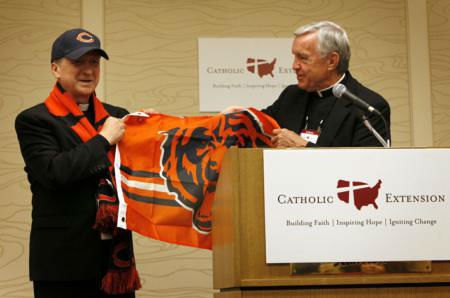'The Francis effect' in Chicago
At the American bishops' fall general meeting last year reporters pressed hard to find signs of the Francis effect. But when the bishops gather next month in Baltimore, the press corps can relax. All they need do now to observe the Pope's impact on the American hierarchy is take a look at the newly named Archbishop of Chicago, Blase Cupich.
The surprise appointment of Archbishop Cupich, 65, to succeed Cardinal Francis George as head of the nation's third largest diocese, the lynchpin of Catholicism in the heartland, was Pope Francis' biggest and boldest step yet toward reshaping the American hierarchy to his taste.
It's also been called a comeback for the Bernardin era. Those were the years stretching from the late 1970s until his death in 1996 when Cardinal Joseph Bernardin was the dominant figure in American episcopal ranks, not only in his Chicago archdiocese but on the national level. Cardinal Bernardin was indeed a man of exceptional abilities, yet those were scarcely halcyon days for the Church.
But this way of viewing Archbishop Cupich's appointment is probably unfair to him. Instead of linking him to another man in another era, it makes more sense to understand his appointment in light of what Pope Francis says now about the kind of bishop he wants.
Francis has often spelled that out. Speaking last February to the Vatican's Congregation for Bishops, the curial department tasked with vetting candidates for the pope's consideration, he extolled "professionalism, service and holiness of life," and said bishops should be "guardians of doctrine, not to measure how far the world lives from the truth it contains but to fascinate the world, to enchant the world with the beauty of love, to seduce it with the free gift of the gospel."
That's a lovely thought of course. But fascinating, enchanting, and seducing the world with Catholic doctrine first of all require that doctrine be taught clearly and with conviction, including even doctrines that are hard sayings to the ears of the world.
It's a curious thing, by the way, that Pope Francis reportedly bypassed the bishops' congregation in choosing Archbishop Cupich, whose previous episcopal appointments were in Rapid City, S.D., and Spokane. But that is a pope's prerogative. If the report is true, it underlines the significance of this appointment as an indicator of Francis' episcopal preferences.
Unavoidably, these developments recall the days immediately after Vatican Council II, when Rome was eager to appoint so-called pastoral bishops thought to be attuned to the spirit of the council. That was followed, starting in the early eighties, by the era of so-called "John Paul II bishops," reputedly firmer in doctrine and discipline than their predecessors. Now, it seems, we're in the era of "Pope Francis bishops" of whom Archbishop Cupich is presumably exemplary.
Ordinary Catholics may perhaps be excused for a certain wonderment at these shifting ideological winds. A good bishop is a good bishop, some might say--can't we leave it at that?
And what is a good bishop after all? For what it's worth, here's my version: A good bishop is a man of prayer, deeply in love with Christ and his Church, who enthusiastically accepts Catholic teaching and transmits it clearly, integrally, and persuasively, a pastor with a human touch who believes in mercy though not in watering-down, a competent administrator who seeks advice and takes it when it's good, a brother to his priests and father to his people.
If a bishop looks like that, who cares what label is attached to him?
- Russell Shaw is the author of more than twenty books. He is a consultor of the Pontifical Council for Social Communications and served as communications director for the U.S. Bishops.



















